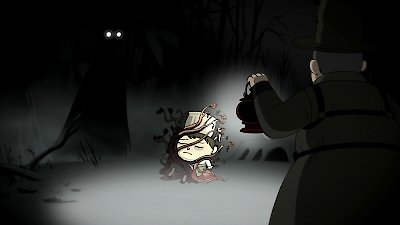The Beast - Over the Garden Wall
A new seasonal re-watch for me is Over the Garden Wall. Over the Garden Wall is perfect autumnal vibes, and a great way to bring in the fall every year. Despite it’s fairly recent creation, it has a timeless feel. It’s art style is reminiscent of old-school hand drawn and hand painted animation. Even though it was only first broadcast in 2014, and I only first saw it a few years ago, it has become a fast classic in my home.
The story of Over the Garden Wall is that two brothers, Wirt and Greg, are lost in some woods known as The Unknown. They encounter many strange interactions and interesting characters on their search for their way home. The show is also littered with beautiful original music and unique jokes that never punch down. It’s a beautiful show.
That being said, it’s spooky season, and just a few days before Halloween. So let’s talk about the primary antagonist of the show - the Beast.
Despite the beast being the main antagonist, he only actually appears in four of the ten episodes. But he’s a constant presence, and a threat that is also whispered about by other characters. When we do see him, he’s always silhouetted, a figure of shadow with only two glowing eyes. He stands tall as a tree trunk, with antlers also twisted like that of a tree. He fades into the forest, in a way, easily able to be a part of the forest while also standing away from it when needed. Aesthetically, he recalls a Leshee, with glowing eyes like Will o the Wisps.
The Beast roams the forest - he believes he owns the forest - and is said to eat children who lose their way. When we do see him, he’s manipulating the Woodsman, a quietly threatening force who sings in the woods and hunts the two brothers who have lost their way.
But we can’t really talk about the Beast without talking about the other primary force in the show: the Unknown. The world the brothers find themselves in is also its own force in the show. It’s a strange place, one that seems to have its own force and will. The brothers always seem pulled in the wrong directions.
There are many theories regarding the Unknown. Due to the ambiguous end of the show, it could have been all a dream. Or maybe it’s a purgatory - a place between life and death that the brothers are trying to navigate. I think an argument could be made for the purgatory far more than the dream aspect, but I have my own theory. For me, the Unknown represents an important aspect of life: adaptation. The brothers must always adapt - find new ways to navigate and new ways of understanding the world around them. Constant adaptation can be difficult, though, and the constant need to adapt gradually gets to the oldest brother Wirt.
And this is where the Beast roams. The Beast seeks the souls in the woods, those who wander and grew too tired of the constant need to change and adapt. And when these souls are no longer able to adapt, they slow and become trees.
The Beast is the hopelessness of the woods - the feeder on the desperate and those who have become too lost to even attempt to keep finding their way. When fighting with Wirt and the woodsmen in the final episode, a light flashes on the Beast and - for just a flash - we see what he truly looks like when not an imperceptible shadow. He looks like the trees that become the souls, with faces of the lost and hopeless covering his body. He’s not just someone who feeds on the lost souls in the woods, but someone who is the embodiment of the forlorn.
When people are not hopeless by their own design, as Wirt became, then the Beast makes them hopeless by striking bargains, lying and manipulating those around him. He convinced the Woodsmen to carry his lantern by making the woodsmen believe that his daughter’s soul was kept alive by the lantern. He works to keep those around him hopeless, feeding on the excitement and energy of those around him until they become too tired and too demoralised to keep going on. We see this happen to Greg, who starts his time with the Beast with energy and the ability to construct and work around the impossible tasks the Beast gives him. But over time, it becomes more and more difficult for Greg to continuously adapt, and think creatively, around the Beasts requests. The Beast drew out the hopelessness in his desire to create more lost souls to feed upon.
The point of Over the Garden Wall is to teach us about the importance of adaptability, and to never lose hope. Change is not impossible, even in the face of those who drain it out of us, and make us feel desolate and lost.



